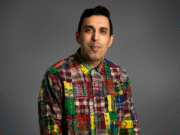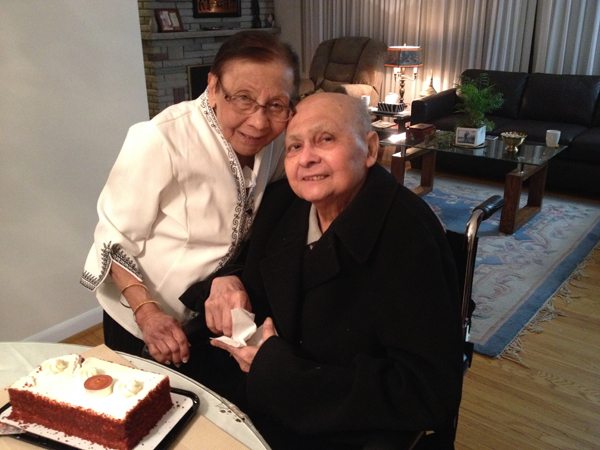This is the first installation of a two-part series on the sensitive issue of elderly care. Blogger Farhan Dhalla shares his personal story examining the cultural expecations, the medical needs required and trying to find the balance between the two.
When we first got the news that my father had cancer I remember feeling completely numb. I couldn’t feel much of anything other than disbelief. Of all the times we had been to the hospital and seen doctors for various reasons over the years, this was the hardest pill to swallow. I couldn’t believe we were faced with yet another — and what would be our greatest — challenge as a family. Though we got through it and dad's cancer went into what the doctors called remission, the accumulation of all his morbidities including heart disease, high blood pressure, arthritis and diabetes had taken a huge toll on him physically and mentally. He functionally declined rapidly to the point where we were faced with a few tough decisions — some of the hardest decision we have ever had to make.
The illness of any family member, including a parent, can change everything. The need to "step up to the plate" and ensure his or her care is not something anyone can really be prepared for. Family roles of caretaking by children can be stressful. There is an overwhelming feeling of insecurity, increased responsibilities and uncertainties about the future. All of sudden there’s meetings with doctors, managing drugs, handling finances as well as other day-to-day tasks. I recall many of my friends telling me “Farhan, I don’t know how you do it.” And my response was always “I don’t know. I just do.” I believe that there is a force far greater then me that is working though me. It carries me through every challenge, not just the ones with my parents. It’s difficult to put in words but I do feel its presence.
At this point in my life I had to lean on it like never before.
In August 2014, dad’s health continued to decline rapidly. We admitted him to the hospital where a team of doctors, social workers and nurses suggested to our family that it was now time to consider placing dad in a long-term care facility. The news ripped us all apart. We were completely overwhelmed. Our first response was a definite “No way, we’re not doing that to him.” The feelings of guilt of having to place dad in a home was almost too much to bear. Though we are a modern Canadian family and in Canada we are fortunate to have well established nursing care facilities that are equipped to take care of the elderly, we still held the traditional South Asian beliefs that you always take care of your elderly. But we were forced to start the discussions around the topic.
Reluctantly we were faced with having to consider long-term care. Deep down we knew that no matter how we felt we really didn’t have a choice. Those feelings included guilt, hopelessness and frustration as well as many other emotions. But it was important to remain objective and decide what was best for dad.

This whole process broke my mother’s heart. She was determined to keep dad at home as long as possible. “It is my duty as a wife to take care of my husband, " she would say. But she too had health issues and my concern was that if we brought dad home then she would suffer physically, mentally and emotionally. Mom eventually realized she didn’t have the capacity for dad’s heath care demands thus we proceeded with the application process. In November 2014, dad was moved from the hospital into a nursing home.
We were in a constant state of inner conflict. Doing what was right for dad and what we felt were our obligations to our father from a cultural standpoint made this whole process very difficult. As South Asians we have always valued the importance of taking care of our elders. Though this belief has not changed for us we also had to recognize that we didn’t have the means and capacity to keep dad at home. It’s not what we wanted but when we look back most of us in the family are at peace with the decision we made.
When evaluating whether to place an elderly in long-term care each family must decide for themselves what is right for them. It requires open and honest discussions. Though there may be many perspectives about what to do, at the end of the day, it’s important to stay focused on what is best for the concerned family member.
The question of whether or not to place dad in long-term care was a very difficult decision. This journey did not get any easier for us. During dad’s final hospitalization we were faced with an even a tougher decision. One which I will discuss further in Part Two of this blog entitled “The Decision to Prolong Life or Death.”
Helpful Resources for Long-term Care
In Canada each province has it’s own application process and website.
Ontario: www.health.gov.on.ca/en/public/programs/ltc/
Choosing Long-Term Care in the United States: www.webmd.com/healthy-aging/choosing-long-term-care
Introduction to Care Homes in the United Kingdom: www.ageuk.org.uk/home-and-care/care-homes/
List of Senior Age Homes in India: www.seniorindian.com/old_age_homes_list.htm
Main Image Photo Credit: Farhan Dhalla
Farhan Dhalla
Author
Spiritual Personal Trainer, Angel Therapist, Author, Television Personality Farhan is the world’s first Spiritual Personal Trainer. Farhan believes we can only succeed in any our life goals when we are in alignment with our spiritual Self. Farhan uses unique techniques to he...
























































































































